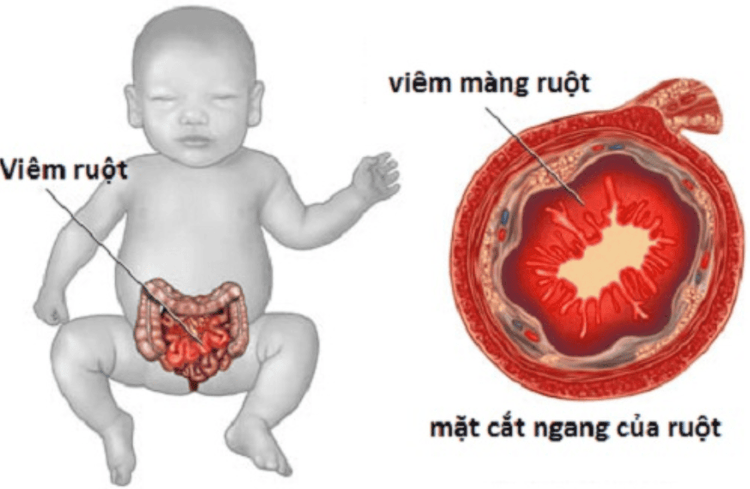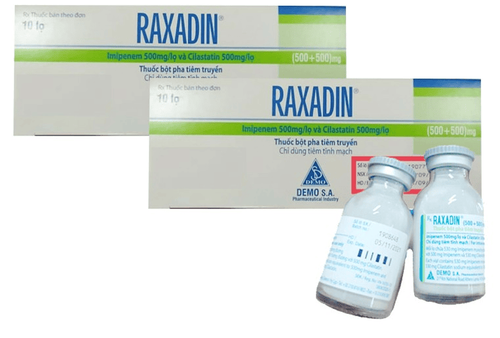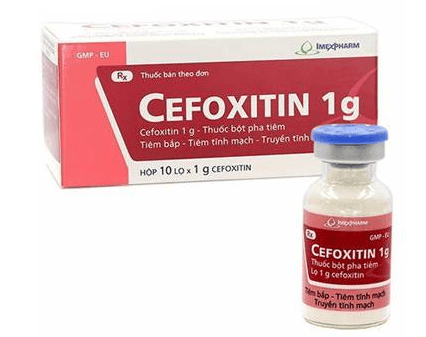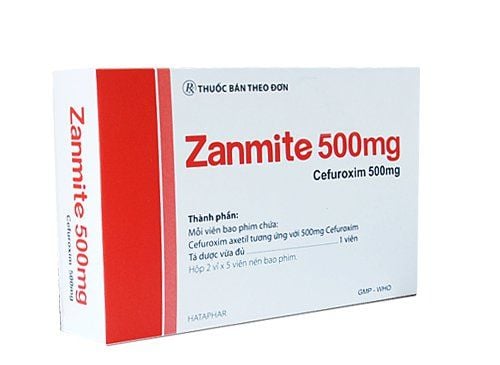This is an automatically translated article.
The article was professionally consulted by Specialist Doctor I Nguyen Thi My Linh - Neonatologist - Pediatrics - Neonatology - Vinmec Danang International General HospitalNecrotizing enterocolitis is a serious illness in neonates. The lower the birth weight, the higher the risk of necrotizing enterocolitis, which affects the absorption of nutrients necessary for the child's development and life.
1. What is neonatal necrotizing enterocolitis?
Necrotizing enterocolitis is a serious disease affecting the intestinal structure and function of premature infants. It usually occurs within the first 2 weeks of life in babies who are fed formula instead of breast milk.
Regarding the pathogenesis of necrotizing enterocolitis in neonates, bacteria will invade the intestinal wall and cause an inflammatory response. As a result, the intestinal mucosal structure loses its integrity and allows bacteria from within the intestinal tract to leak into the abdominal cavity, which is a sterile environment. If left untreated, necrotizing enterocolitis is an etiology that can lead to generalized peritonitis, intra-abdominal infection, spreading sepsis, and other serious complications, including death.
2. What is the cause of neonatal necrotizing enterocolitis?
To date, the actual cause of neonatal necrotizing enterocolitis is not well understood. It has been hypothesized that neonatal necrotizing enterocolitis can occur if the lower digestive system is not supplied with adequate blood and oxygen. Accordingly, bacteria from the environment inside the intestinal cavity will multiply to cause disease and damage the intestinal mucosa. At this time, the cells will be degraded and necrotic, the intestinal wall will be perforated and the infection will spread into the abdominal cavity.
Another hypothesis has been raised since some observations suggest that neonatal necrotizing enterocolitis is more commonly acquired in premature infants than in term infants. These are babies with immature lung and intestinal structures, weak function and less mature than full-term babies. That can make the child's body unable to supply enough blood and oxygen to the ends of each intestinal cell.

3. What are the risk factors that predispose infants to necrotizing enterocolitis?
Fortunately, necrotizing enterocolitis in neonates is also relatively rare. The disease affects only 1 in 2,000 to 4,000 live births. Although necrotizing enterocolitis can occur in any newborn baby, it tends to be acquired in premature infants weighing less than 1500 grams.
In addition, babies born prematurely will also be at risk of necrotizing enterocolitis if they have some of the following risk factors, including:
Premature birth: Premature babies will have less mature bodies than full-term babies . This means that these children may have defects in the way blood flows and carries oxygen. In addition, the infant's intestinal tract is still immature, not ready to fight infection, so it increases the chance of neonatal necrotizing enterocolitis. Formula feeding: Any premature baby is at risk for necrotizing enterocolitis. However, the likelihood is increased if these babies are formula-fed without receiving breast milk. Because, breast milk is inherently the best and most suitable food for babies, easier to digest, contains substances that help fight infections and help intestinal cells mature. Difficult birth or low oxygen levels at birth: Babies born after a prolonged labor or low oxygen levels after birth are more likely to have necrotizing enterocolitis. Because when there is too little oxygen, the body will prioritize sending blood and oxygen to the brain and heart first. This will further reduce blood flow to the intestinal tract, leading to anaerobic metabolism and easy necrosis. Other risk factors: In addition to the above factors, infants are more likely to develop necrotizing enterocolitis if there is an existing infection in the intestinal tract, too high a concentration of circulating red blood cells in the blood. the newborn is seriously ill or has received a blood transfusion...

4. What are the symptoms of neonatal necrotizing enterocolitis?
The symptoms of necrotizing enterocolitis in infants can vary widely from child to child. However, in most cases, your baby will have the following signs and will usually progress quickly in the first two weeks of life:Constant fussing Irritability, restlessness Stomach bloating or gas Decreased bowel movements or disappear completely Food stagnation in the stomach Vomiting green fluid from the stomach Vomiting blood Difficulty breathing Tachycardia

5. How is neonatal necrotizing enterocolitis diagnosed?
In addition to the above symptoms - very easily confused with other gastrointestinal diseases or in multi-organ lesions, necrotizing enterocolitis can be diagnosed based on abdominal X-ray and a number of tests blood . These laboratory tests are very common and are easily performed in any neonatal intensive care unit.
When x-ray of the abdomen, necrotizing enterocolitis will show the image of tiny air bubbles in the intestinal wall. Abdominal ultrasound showed more distended bowel loops and decreased peristalsis, and in some cases air was seen in the portal vein. In addition, blood tests also show signs of infection.
6. What are the treatments for neonatal necrotizing enterocolitis?
The treatment of necrotizing enterocolitis in neonates will depend on several factors, including the baby's age at birth, overall health, and other comorbidities.
At this time, the doctor will consider doing the following steps step by step:
Stop feeding by mouth so that the intestinal tract can reduce excretion and rest, heal quickly. Insertion of a tube through the nose and into the stomach to drain gastric secretions, releasing the intra-abdominal volume burden. Infusion to ensure energy and provide adequate water and electrolytes. Prescribe antibiotics to fight infection. Take regular X-rays to monitor bloating and slow digestion. Give extra oxygen or a ventilator if the abdomen is too distended and breathing threatens. Isolate from other children to prevent the spread of necrotizing enterocolitis.

On the contrary, if the condition does not improve with active treatment or there are complications of intestinal perforation, the child will need urgent surgery. Through laparotomy, the doctor will isolate and remove the segment of intestine with necrotic mucosa, cleaning the entire abdominal cavity.
In summary, neonatal necrotizing enterocolitis is one of the common diseases in preterm infants. Although the etiology of the disease is unknown, in infants predicted to be at high risk, universal measures to prevent necrotizing enterocolitis should be instituted from birth by exclusive breastfeeding. At the same time, when the child has any of the above-mentioned suspicious signs, it is necessary to actively examine and treat, to improve the long-term prognosis.
Pediatrics department at Vinmec International General Hospital is the address for receiving and examining diseases that infants and young children are susceptible to: viral fever, bacterial fever, otitis media, pneumonia in children, ... With modern equipment, sterile space, minimizing the impact as well as the risk of disease spread. Along with that is the dedication from the doctors with professional experience with pediatric patients, making the examination no longer a concern of the parents.
Please dial HOTLINE for more information or register for an appointment HERE. Download MyVinmec app to make appointments faster and to manage your bookings easily.














